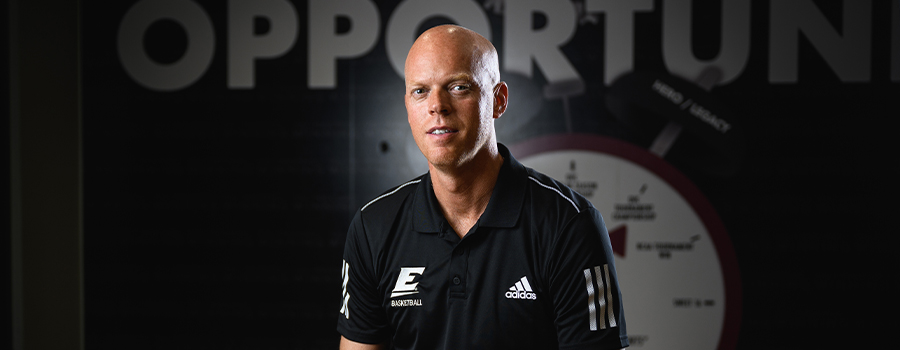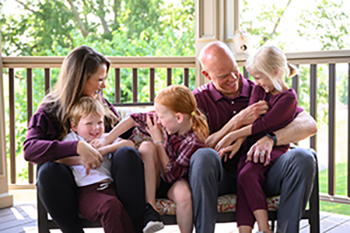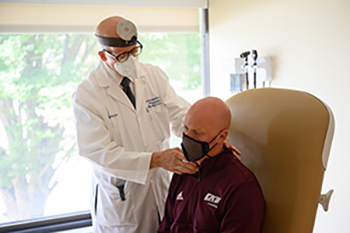This basketball coach's goal? Beat cancer.

A melanoma diagnosis didn’t slow A.W. Hamilton down. He was determined to overcome this disease and inspire others with his story.
Motivated by a conversation with his grandfather, A.W. Hamilton has been writing his goals on his bathroom mirror since high school.
At the age of 40, Hamilton, head basketball coach of Eastern Kentucky University, has accomplished a lot when it comes to reaching his goals. In six years as head coach of Hargrave Military Academy and entering his fourth season at EKU, he has compiled a 288-64 record. Two of his former players were selected in the 2015 NBA Draft. At EKU, he has guided the program to a historic turnaround since arriving in 2018. Under his leadership, the Colonels have broken 19 school records, highlighted by 15 conference wins this past season – the most in school history. On top of it all, Hamilton was named the Ohio Valley Conference Coach of the Year and National Association of Basketball Coaches (NABC) District 18 Coach of the Year in 2020.
 And he isn’t done yet. He has three million-dollar checks on his mirror, one for each of his children when they turn 18, and he wants to start the largest charity foundation in Kentucky.
And he isn’t done yet. He has three million-dollar checks on his mirror, one for each of his children when they turn 18, and he wants to start the largest charity foundation in Kentucky.
But when Hamilton was unexpectedly diagnosed with melanoma in 2020, he didn’t know what to make of his mirror of goals.
“I’m thinking to myself, ‘How am I going to accomplish all this?’” he said. “I got into a really dark place because I wasn’t sure what was going to happen to me, if I was going to be able to do the things that I set out to do.”
His diagnosis came after his brother-in-law had a stroke – a wake-up call that inspired Hamilton to get a physical for the first time since 2004. While all of his tests came back normal, there was a small mole on the back of his ear that his doctor sent off for a biopsy. Turns out, it was melanoma. Within two days, Hamilton was sitting in the office of Dr. Joseph Valentino, an oncology head and neck surgeon at UK Markey Cancer Center.
“I was freaking out,” Hamilton said. “But I was like, ‘You know what? I’ve got to regroup here.’ So I made a new goal: to beat cancer, tell my story and save somebody else’s life.”
Valentino discovered that the mole on Hamilton’s ear had intermediate thickness, meaning the cancer had a chance of spreading throughout his body through lymph nodes and blood vessels.
Hamilton underwent a PET scan so that Valentino could see how much the cancer might have spread before recommending a treatment plan.
“Melanoma, unlike other malignancies of the skin, is one that most dermatologists will refer if it has any depth of invasion because of the risk of its spread,” Valentino said. “That process is called metastasis, and we see metastatic spread of melanoma far more commonly than some of the other more common skin cancers.”
 Thankfully, the cancer hadn’t spread throughout Hamilton’s body, so Valentino and his team were able to surgically remove the tumor and several surrounding lymph nodes. During the surgery, Hamilton’s ear was taken apart and put back together. The process left a four-inch scar, and Hamilton has little to no feeling on the right side of his face. But the surgery was successful, and he says he’s just glad to be cancer-free.
Thankfully, the cancer hadn’t spread throughout Hamilton’s body, so Valentino and his team were able to surgically remove the tumor and several surrounding lymph nodes. During the surgery, Hamilton’s ear was taken apart and put back together. The process left a four-inch scar, and Hamilton has little to no feeling on the right side of his face. But the surgery was successful, and he says he’s just glad to be cancer-free.
Today, Hamilton sees Valentino every few months to get CAT scans to ensure the cancer is gone and no other types of skin cancer have occurred. Valentino says Hamilton will need five years of visits with no issues before scheduling the visits further apart. Still, it’s likely Hamilton will have regular cancer screenings by his dermatologist for the rest of his life.
But now that he has been cancer-free for a year, Hamilton’s back to focusing on the goals on his mirror at home. He has even added some new ones
– specifically, he’s determined to share his story with as many people as possible and encourage them to go to the doctor regularly.
“When this happened to me, I was 39 years old. I work out three or four times a week. At that time, I was running over a mile a day. I was healthy,” he said about his life pre-cancer. “So my message is: If this can happen to me, it can happen to you.”




